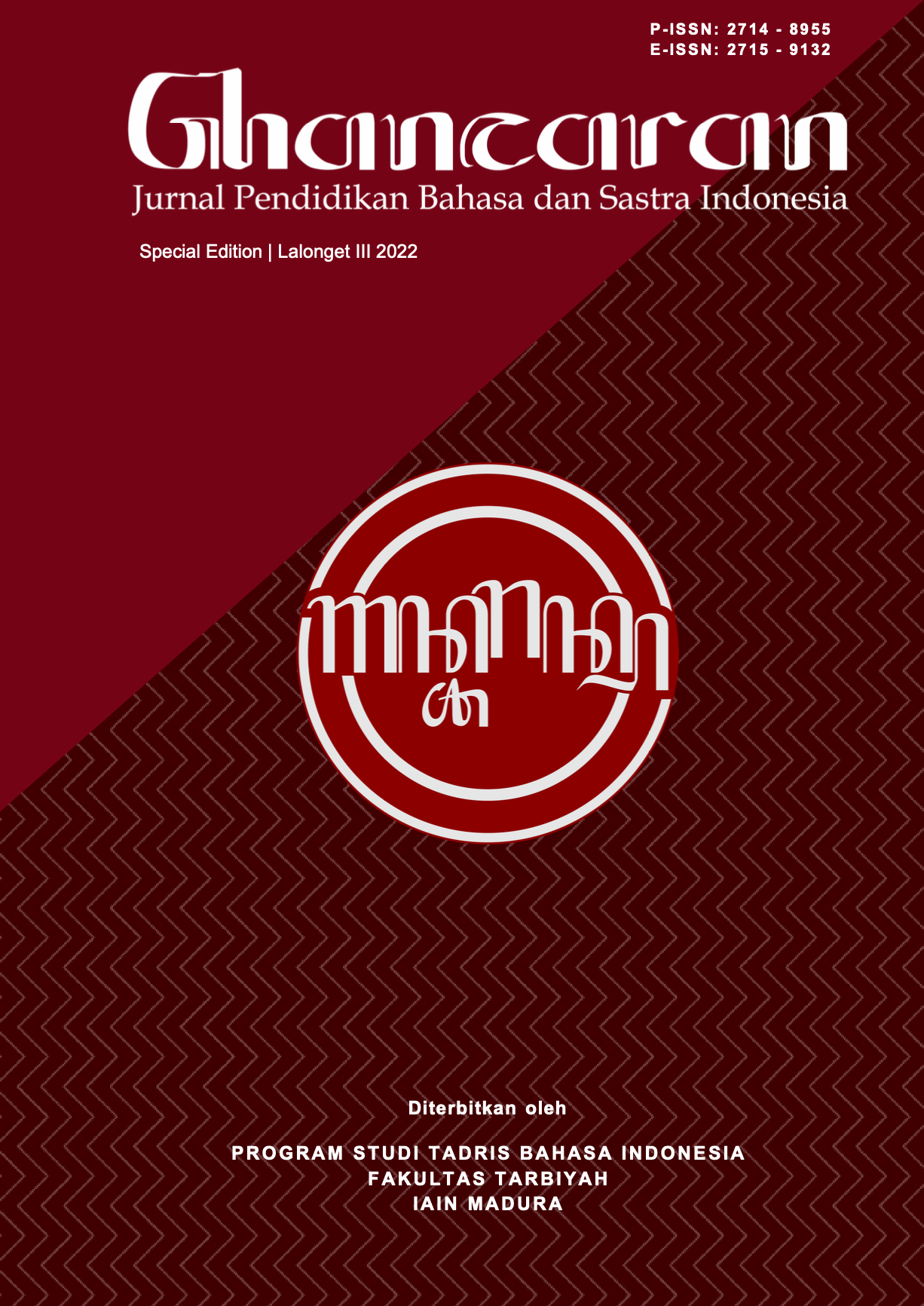Implementasi Kecakapan Logika dan Kreativitas melalui Humor dalam Materi Teks Anekdot Kelas X SMA dengan Kurikulum Merdeka
 Abstract views: 481
,
Abstract views: 481
,
 PDF downloads: 414
PDF downloads: 414
Abstract
The research aim to describe The profiency of logic and creativity in class X anecdotal text material developed in the independent curriculum. The approach and design in this research is qualitative with text analysis as the research objective in the form of content analysis. The results of the study show that the aspects of creativity are accommodated and creativity in learning is related to anecdotal text material in the independent curriculum. Moreover, the exploration of its development is quite explorative by linking anecdotal text material with comedic art that is currently popular, namely stand up comedy.
Downloads
References
Dardjowidjojo, S. (2003). Psikolinguistik: Pengantar Pemahaman Bahasa Manusia. Yayasan Pustaka Obor Indonesia.
Dermansyah. (2010). Strategi Pembelajaran Menyenangkan dengan Humor. PT Bumi Aksara.
Gumilar, S. I., & Aulia, F. T. (2021). Cerdas Cergas Berbahasa dan Bersastra Indonesia. Pusat Kurikulum dan Perbukuan Badan Penelitian dan Pengembangan dan Perbukuan Kementerian Pendidikan, Kebudayaan, Riset, dan Teknolog.
Harijanti, S. (2020). Makna Tersirat dalam Teks Anekdot Bahasa Indonesia Kelas X. Kementerian Pendidikan dan Kebudayaan Direktorat Jenderal Pendidikan Anak Usia Dini, Pendidikan Dasar dan Pendidikan Menengah Direktorat Sekolah Menengah Atas.
Hoang, T. N. (2005). The Philosophy of Humor. https://www.academia.edu/9819670/The_Philosophy_of_Humor
Nafiati, D. A. (2021). Revisi taksonomi Bloom: Kognitif, afektif, dan psikomotorik. Humanika, 21(2), 151–172.
Nurhadi. (2017). Handbook of writing: Panduan Lengkap Menulis. PT Bumi Aksara.
Nurmanarina, T. (2022, November 21). Bagaimana Saya Menulis? | Narabahasa. https://narabahasa.id/nawala-narabahasa/bagaimana-saya-menulis
Paulus Ari Subagyo. (2008). Beberapa Permainan Bahasa dan Permainan Logika dalam Humor SMS. Sintesis, Vol 6, No 2 (2008), 154–167.
Puspitasari, A. C. D. D. (2020). Kreativitas Peserta Didik Anak Sekolah Dasar (SD) Melalui Pembelajaran Bahasa Indonesia dengan Pendekatan Scientific. Trapsila: Jurnal Pendidikan Dasar, 2(02).
Raditya, L. (2021, Agustus). Tips Bikin Materi Stand Up Comedy: Nulis Komedi yang kayak Bikin Skripsi—Terminal Mojok. https://mojok.co/terminal/tips-bikin-materi-stand-up-comedy-nulis-komedi-yang-kayak-bikin-skripsi/
Romadhon, R. (2021, Desember). Pentingnya Data dan Informasi bagi Kesuksesan Sebuah Perusahaan | SoftwareSeni—Jasa Pembuatan Aplikasi dan Website, Mobile Apps (Android & iOS), dan Toko Online. https://www.softwareseni.co.id/.
Sidharta, A. (2020). Pengantar Logika-Sebuah Langkah Pertama Pengenalan Medan Telaah. PT Refika Aditama.
Suriasumantri, J. S. (1995). Filsafat ilmu: Sebuah pengantar populer. Pustaka Sinar Harapan.
Warsono. (2022). Logika Cara Berpikir Sehat. PT Raja Grafindo Persada.
Yuliarti, Y. (2018). Kreativitas Mahasiswa dalam Mengembangkan Paragraf melalui Pembelajaran Bahasa Indonesia dengan Pendekatan PBL. Indonesian Journal of Learning Education and Counseling, 1(1), 42–46.
Zamahsari, G.K., Putikadyanto, A. P. A., dan Maulana, F. I. (2020) "The Contribution of Assessment Platform Technology to Promote Teacher’s Work in Schools." 2020 6th International Conference on Interactive Digital Media (ICIDM). Bandung, Indonesia. pp. 1-5.
Zubaidah, S. (2010). Berpikir Kritis: Kemampuan Berpikir Tingkat Tinggi yang Dapat Dikembangkan melalui Pembelajaran Sains. In Makalah Seminar Nasional Sains dengan Tema Optimalisasi Sains untuk memberdayakan Manusia. Pascasarjana Unesa (Vol. 16, No. 1, pp. 1-14).
Copyright (c) 2023 GHANCARAN: Jurnal Pendidikan Bahasa dan Sastra Indonesia

This work is licensed under a Creative Commons Attribution-ShareAlike 4.0 International License.
Ghancaran: Jurnal Pendidikan Bahasa dan Sastra Indonesia uses an Open Access Policy under the Creative Commons Attribution-ShareAlike 4.0 International License. Authors publishing in this journal agree to the following terms:
- Ghancaran Journal holds the copyright and grants the journal rights for first publication with the work simultaneously licensed under a

The work is distributed under Creative Commons Attribution-ShareAlike 4.0 International License which allows others to share, copy, and redistribute the material in any media or format and adapt, remix, change, and develop the material even for commercial purposes, as long as it is stated credit and license derivative works under similar terms. - Authors may make additional contractual arrangements for non-exclusive distribution of the journal's published work version.
- Authors are permitted to post their work online (e.g., in institutional repositories or on their websites) before and during submission, as doing so may lead to productive exchange.



















